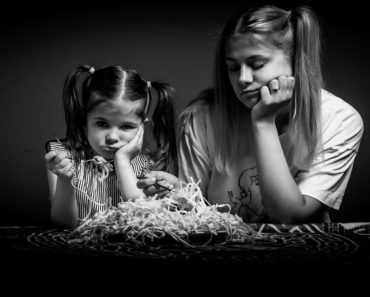Contents
- 1 Overcoming Guilt: A Stepparent’s Journey to Healing after Infidelity in Marriage
- 2 Understanding the Source of Guilt in Stepparent Cheating
- 3 Taking Responsibility and Making Amends as a Stepparent After Cheating
- 4 Seeking Professional Support for Healing and Moving Forward
- 4.1 How can a stepparent deal with feelings of guilt caused by their partner’s infidelity in the marriage?
- 4.2 What strategies can a stepparent employ to overcome the guilt and betrayal experienced due to their partner’s cheating?
- 4.3 Are there any recommended resources or support groups specifically for stepparents struggling with guilt stemming from infidelity in their marriage?
- 4.4 Related Posts

Introducing: Stepparent Magazine’s latest article on dealing with the overwhelming guilt caused by cheating in marriage. Discover effective strategies to heal, rebuild trust, and move forward towards a healthier and happier stepparenting journey. Join us as we delve into this sensitive and important topic. Let’s overcome guilt together!
Overcoming Guilt: A Stepparent’s Journey to Healing after Infidelity in Marriage
Overcoming Guilt: A Stepparent’s Journey to Healing after Infidelity in Marriage
Infidelity in a marriage can be incredibly devastating, especially for the stepparent involved. It is not uncommon for stepparents to experience overwhelming guilt and self-blame for the breakdown of their blended family.
The journey to healing after infidelity requires significant effort and self-reflection. The stepparent must acknowledge and address their feelings of guilt, as well as understand that they are not solely responsible for the affair. Self-forgiveness becomes essential in moving forward and rebuilding trust within the family unit.
Communication plays a vital role in the healing process. Stepparents should openly communicate with their partner about their emotions, insecurities, and concerns. This transparency fosters understanding and empathy, allowing both partners to support each other on their healing journeys.
Seeking professional help is an option that many stepparents find beneficial. Therapists specializing in infidelity can guide couples through the complex emotions and help them develop effective coping mechanisms. It is crucial to remember that seeking help does not indicate weakness, but rather a commitment to healing and building a stronger family bond.
Rebuilding trust takes time and patience. Stepparents may need to demonstrate their dedication, reliability, and consistency to regain trust. It is also important for the couple to establish clear boundaries and expectations to prevent future transgressions.
Self-care is paramount throughout this healing journey. Stepparents should prioritize their own emotional and physical well-being. Engaging in activities that bring joy and practicing self-compassion can aid in overcoming guilt and moving towards personal growth.
In conclusion, overcoming guilt as a stepparent after infidelity requires self-reflection, forgiveness, open communication, professional help, rebuilding trust, and self-care. It is a challenging journey, but with dedication and support, healing and growth are possible.
Understanding the Source of Guilt in Stepparent Cheating
Guilt in the context of stepparent cheating often stems from a combination of factors, including a sense of betrayal, the disruption of family dynamics, and the fear of damaging relationships with both the biological parent and the stepchild. It is important to acknowledge and understand these underlying emotions in order to move forward and heal.
When a stepparent cheats, it can shatter the trust and sense of security within the blended family, causing immense guilt. The guilt may arise from the realization that the actions have not only hurt the partner but also affected the stepchild who may view the stepparent as a role model or parental figure.
It is crucial to address the guilt by openly communicating with all parties involved, taking responsibility for the actions, and seeking professional help if needed. By understanding the root causes of guilt, it becomes possible to work towards forgiveness and rebuilding trust within the family unit.
Taking Responsibility and Making Amends as a Stepparent After Cheating
When a stepparent cheats, taking responsibility for one’s actions is essential in the process of healing and overcoming guilt. This involves acknowledging the pain caused to both the biological parent and the stepchild, and being willing to make amends.
Making amends as a stepparent can take different forms depending on the specific situation. It may involve sincere apologies, individual or family therapy sessions, offering support and reassurance to the stepchild, and actively working on rebuilding trust within the family.
In the journey of making amends, it is important for the stepparent to demonstrate genuine remorse and commitment to change. Actions such as adopting healthier communication patterns, maintaining open and honest dialogue, and consistently showing love and care can help rebuild the damaged relationships and alleviate guilt over time.
Seeking Professional Support for Healing and Moving Forward
Overcoming guilt caused by stepparent cheating often requires professional support. This can be in the form of individual therapy, couples counseling, or family therapy.
A trained therapist can provide a safe space for all parties involved to express their emotions, process the aftermath of the cheating, and guide them through the healing process. Therapy sessions can help the stepparent understand the underlying issues that led to the cheating, learn effective coping strategies, and develop healthier ways of relating within the blended family.
Professional support also offers an opportunity for the biological parent and stepchild to express their feelings, concerns, and needs, allowing for a more comprehensive healing process and the possibility of rebuilding trust and relationships.
Remember, seeking professional help does not diminish one’s strength or ability to overcome guilt; rather, it demonstrates a commitment to personal growth and the well-being of the entire family unit.
How can a stepparent deal with feelings of guilt caused by their partner’s infidelity in the marriage?
Dealing with feelings of guilt as a stepparent after their partner’s infidelity in the marriage can be incredibly challenging. Here are some steps to cope with these emotions:
1. Acknowledge your emotions: Recognize and accept that feeling guilty is a normal reaction to such a situation. Allow yourself to experience and process these feelings.
2. Seek support: Reach out to close friends, family members, or a therapist who can provide a safe space for you to express your emotions without judgment. Joining a support group for individuals in similar situations can also be beneficial.
3. Understand your boundaries: Determine what you are willing and capable of forgiving and accepting in your relationship. Establish healthy boundaries to protect your well-being and ensure that your needs are being met.
4. Practice self-care: Engage in activities that promote self-care and self-love. This can include exercising, practicing mindfulness or meditation, pursuing hobbies, or seeking professional help if needed.
5. Communicate openly: Initiate an open and honest conversation with your partner about the impact their infidelity has had on you. Express your feelings, concerns, and expectations moving forward. Consider couples counseling as a way to rebuild trust and strengthen your relationship.
6. Release self-blame: Understand that the infidelity was not your fault. It is important to separate your partner’s actions from your own self-worth. Remember that everyone is responsible for their own choices and actions.
7. Focus on the present: Concentrate on rebuilding and improving your relationship with your partner and stepchildren. Redirect your energy towards being the best version of yourself and fostering positive connections within your blended family.
8. Practice forgiveness: Forgiveness is a personal choice and process. It does not mean forgetting or condoning the infidelity, but rather releasing the negative emotions attached to it. Forgiveness can help in moving forward and healing emotionally.
Remember, healing from the aftermath of infidelity takes time, and each person’s journey is different. Be patient with yourself and allow yourself to heal at your own pace.
What strategies can a stepparent employ to overcome the guilt and betrayal experienced due to their partner’s cheating?
Being a stepparent can already come with its own set of challenges, and discovering that your partner has cheated can add an immense amount of guilt and betrayal to the mix. Here are some strategies to help you deal with these emotions:
1. Take time to process your emotions: It’s important to acknowledge and allow yourself to feel the range of emotions that come with such a discovery. Recognize that it’s natural to feel hurt, angry, and betrayed. Give yourself permission to grieve the loss of trust and the idealized vision of your relationship.
2. Seek support: Reach out to someone who can provide a safe space for you to express your feelings, such as a close friend, family member, or therapist. Joining support groups for individuals who have experienced infidelity can also be beneficial in finding understanding and guidance from others who have been through similar situations.
3. Self-care is crucial: Focus on taking care of yourself physically, emotionally, and mentally. Engage in activities that bring you joy and help you process your emotions, such as journaling, exercising, meditating, or pursuing hobbies. Prioritize self-care to rebuild your strength and resilience.
4. Set boundaries: Clearly communicate with your partner about the boundaries you need to heal and regain trust. This may include discussing expectations, seeking transparency, and establishing guidelines for rebuilding your relationship. Be open and honest about your needs and concerns.
5. Practice forgiveness: Forgiveness is a personal choice and a process that takes time. It doesn’t mean forgetting or condoning the infidelity, but rather releasing the negative emotions that may be holding you back. Forgiveness can help you move forward and heal in your own time.
6. Focus on the present: Avoid dwelling on the past and ruminating over the betrayal. Instead, channel your energy into building a positive future for yourself and your family. Set goals, create new memories, and invest in activities that bring you joy and fulfillment.
Remember, healing from infidelity takes time. Be patient with yourself and understand that it is a journey with ups and downs. Seek professional help if needed, and remember that you deserve happiness and a healthy relationship.
Are there any recommended resources or support groups specifically for stepparents struggling with guilt stemming from infidelity in their marriage?
Yes, there are several resources and support groups available for stepparents who are struggling with guilt stemming from infidelity in their marriage. Here are a few recommendations:
1. Stepfamily Foundation: The Stepfamily Foundation offers various resources, including counseling services, support groups, and online forums for stepfamilies dealing with a range of issues, including infidelity-related guilt.
2. Smart Stepfamilies: Smart Stepfamilies is a website that provides articles, advice, and resources for blended families. They have a section specifically dedicated to addressing the challenges of infidelity and its impact on stepfamily dynamics.
3. Stepping Twogether: Stepping Twogether is an organization that offers counseling, workshops, and retreats to help couples and families navigate the complexities of blending families after infidelity. They provide a safe space for stepparents to express their feelings of guilt and work through them.
4. Online Support Groups: There are online communities and support groups specifically for stepparents dealing with infidelity-related guilt. These groups can be found on platforms like Facebook or through dedicated websites. Some examples include “Stepparents Healing After Infidelity” and “Support for Stepparents Dealing with Guilt.”
Remember that seeking professional counseling or therapy can also be beneficial in navigating the complex emotions surrounding infidelity and its impact on your role as a stepparent. It’s essential to prioritize self-care and seek support from others who understand your unique situation.
In conclusion, overcoming the guilt caused by cheating in a marriage as a stepparent can be an immensely challenging and complex process. However, it is important to remember that forgiveness and healing are possible with time, self-reflection, and open communication. By acknowledging our mistakes, taking responsibility for our actions, and seeking professional help or support from loved ones, we can gradually let go of guilt and rebuild trust within our blended family. It is crucial to prioritize the well-being of the children and foster a healthy environment for all family members. Remember, no one is perfect, and we all make mistakes, but it’s how we learn from them and grow that truly matters. With dedication, empathy, and a commitment to personal growth, it is possible to move forward and create a harmonious stepparenting experience for everyone involved.







